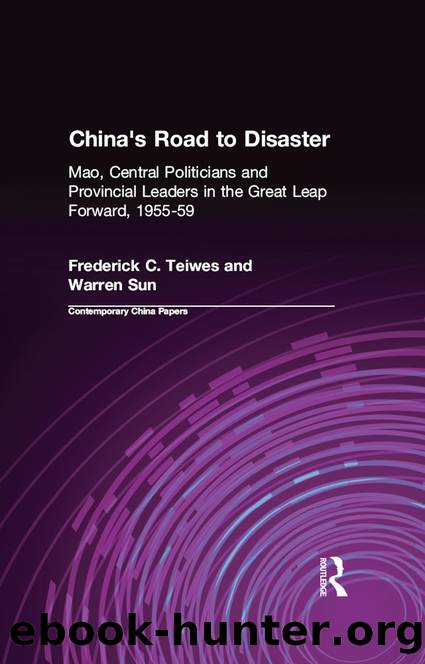China's Road to Disaster: Mao, Central Politicians and Provincial Leaders in the Great Leap Forward, 1955-59: Mao, Central Politicians and Provincial Leaders in the Great Leap Forward, 1955-59 by Frederick C. Teiwes & Warren Sun

Author:Frederick C. Teiwes & Warren Sun [Teiwes, Frederick C. & Sun, Warren]
Language: eng
Format: epub
Tags: International Relations, Ethnic Studies, Social Science, Political Science, Regional Studies, General
ISBN: 9781315502809
Google: N4GTDAAAQBAJ
Goodreads: 30852522
Publisher: Routledge
Published: 1998-08-01T00:00:00+00:00
After Shanghai, AprilâJune 1959: Greater Compromises and Continuing Unreality
The Chairmanâs ill temper and inevitable hesitations among his colleagues notwithstanding, the Shanghai meetings did give a boost to efforts to introduce greater realism into CCP policy. Mao personally continued the effort on the rural front with an April 29 letter to rural cadres denouncing âmere braggingâ and demanding that production targets be based on reality, an effort that allegedly further displeased the Chairmanâs âleftâ-inclined colleagues at the provincial level.101 Meanwhile, the chastened Bo Yibo and Li Fuchun at least had a clearer direction as they convened a two-day conference of planners in mid-April. But undoubtedly the most significant development was the newly authoritative role of Chen Yun who âno one had listened toâ in the months leading up to Shanghai. Now Chen had the benefit of Maoâs clear and repeated statements at the meetings that his (Chenâs) cautious views during the winter had been correct, and he began to influence policy. At Shanghai he acted on the request of Hunanâs Zhou Xiaozhou who even after the second Zhengzhou conference had been on the radical side of rural policy but now wanted Chen to approach Mao about reducing the density of planting, an approach the Chairman had been identified with. Chen agreed with Zhou Xiaozhouâs view, discussed the matter with agricultural czar Tan Zhenlin, and wrote Mao accordingly â with the result that the recommendation was endorsed in the Chairmanâs April 29 letter. But clearly the most significant indication of his growing importance was that, sometime after the conclusion of the plenum, Mao entrusted Chen with investigating the increasingly serious situation concerning steel production.102
While the story of Chenâs involvement in, and the general process of the revision of steel targets, has long been known,103 greater detail is now available which allows a more refined analysis of the politics of the situation. Chenâs efforts came against a background where three views had been expressed on targets at Shanghai. One view, that of a âsmall group,â felt that since the Wuhan targets for 1959 had been publicized, it was necessary to strive to achieve those targets. A second opinion held by âmostâ at the time was that these targets could hardly be achieved and if they were pursued at any cost great political and economic costs would result, and this apparently led to the 16.5 million internal steel target. Finally, a âminorityâ believed that even the low 16.5 million target could not be accomplished and should be revised further.104 What is striking in the events following Shanghai is not only the sharp drop in the steel target and Chen Yunâs critical role in pushing the project forward, but also the seemingly widespread central bureaucratic support for the move. This can be seen in Table 3 (p. 156) which indicates the proposals of various actors.105
Following the Shanghai plenum the SPC became involved in the steel question with Vice Chairman Jia Tuofu, the ârightistâ of the planning leaders in Maoâs early 1958 assessment, calling in various officials to check the actual steel output for 1958.
Download
This site does not store any files on its server. We only index and link to content provided by other sites. Please contact the content providers to delete copyright contents if any and email us, we'll remove relevant links or contents immediately.
Spell It Out by David Crystal(35864)
Life for Me Ain't Been No Crystal Stair by Susan Sheehan(35551)
Cecilia; Or, Memoirs of an Heiress — Volume 1 by Fanny Burney(32098)
Cecilia; Or, Memoirs of an Heiress — Volume 3 by Fanny Burney(31491)
Cecilia; Or, Memoirs of an Heiress — Volume 2 by Fanny Burney(31439)
The Great Music City by Andrea Baker(30938)
Professional Troublemaker by Luvvie Ajayi Jones(29449)
We're Going to Need More Wine by Gabrielle Union(18664)
Twilight of the Idols With the Antichrist and Ecce Homo by Friedrich Nietzsche(18326)
The Secret History by Donna Tartt(18276)
All the Missing Girls by Megan Miranda(14879)
Cat's cradle by Kurt Vonnegut(14811)
Pimp by Iceberg Slim(13830)
Bombshells: Glamour Girls of a Lifetime by Sullivan Steve(13720)
Fifty Shades Freed by E L James(12941)
Talking to Strangers by Malcolm Gladwell(12926)
Norse Mythology by Gaiman Neil(12887)
The Social Justice Warrior Handbook by Lisa De Pasquale(11970)
Underground: A Human History of the Worlds Beneath Our Feet by Will Hunt(11862)
